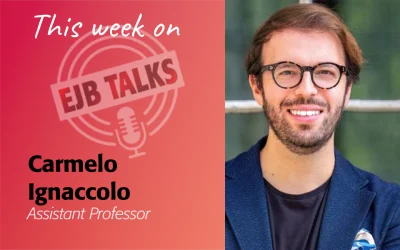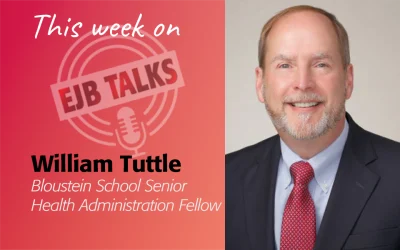Professor Anita Franzione joins Stuart Shapiro on this episode of EJB Talks to embark on a frank discussion about aging, public health and policy. Dr. Franzione discusses public health issues facing older citizens from sexually transmitted diseases to COVID. She reflects on how the pandemic has exacerbated discrimination the elderly already face in health care settings. Currently, they have to navigate well-intended policies such as COVID vaccine distribution where despite being prioritized, the elderly face registration and other challenges. Anita also discusses her classroom focus and passion at Bloustein; educating the next generation of practitioners about the elderly, their incredible societal value, and their needs.
Stuart Shapiro
Welcome to EJB Talks. I’m Stuart Shapiro, the Associate Dean of the Faculty at the Bloustein School, and the purpose of this podcast is to talk with my colleagues and our alumni about policy planning and health, the interaction between these issues, and how they affect people here in New Jersey, the United States and across the world.
Today, I’m very happy to have Professor Anita Franzione, who teaches in our undergraduate public health program and in our health administration program. Welcome to the podcast, Anita.
Anita Franzione
Thank you, Stuart. It’s great to be here.
Stuart Shapiro
So you do a lot of work surrounding aging and public health. How did you become interested in this?
Anita Franzione
In an indirect manner. I was always very much interested in evaluation studies and looking at programs and how do you evaluate them. I was hired by an organization whose sole purpose was to act as a third-party evaluator for Medicare and Medicaid services being provided in the state of New Jersey. So with that, when I got on, I first did some Medicaid evaluation studies, but then was brought into the Medicare side. And I really got interested in services that were being provided to the over-65 population and then giving that information back out to primarily the hospitals. We were the first ones to start to look at rehospitalization. That was way back, now it’s a law. But we did that in New Jersey, and gave that information back to the hospital saying, “This is a problem.” So from there, I just got more and more involved in Medicare and then started to bring in my public health side, saying what are we going to be doing for this population, as everyone gets older.
Stuart Shapiro
And everyone does get older, so…. ((laughing))
Anita Franzione
I tell my students every day you got up, you put your foot out of your bed, you just got a day older. So welcome. ((laughing))
Stuart Shapiro
((laughing)) Now students, and I certainly remember myself at that age, probably have trouble believing that. How do the students react when you talk to them about aging?
Anita Franzione
What I first talk to them about… first I give them the, I don’t want to say the scary picture, but I tell them how many are out there that you don’t realize it. That you know, one out of five people…Let’s count, by 2030 is going to be over 65 you know, some turn to your right and turn to your left. But then when I start to bring in, and this really brings it home, and brings it more concrete. How do we react to people in this age category? What do we call them? What do we refer to them? And that actually, it’s ageism.
And this is something that it’s really the last -ism that we don’t look at. We don’t deal with it. We think it’s funny. A lot of comedy acts are done with the little white-haired lady, going to Walmart and all. And think of your verbiage, and think of even just saying the words”little old lady”, that’s insulting. And when they start to look at that, that’s when they’re like, wow, that’s when their eyes open. Because we’re very much, we love youth. That’s what they feel they feel empowered, their youth, and the life is ahead of them that isn’t this great. But when you start to look at things and say we dismiss people, because of age. Whether or not you’re conscious of it or not, you do. You don’t feel they bring in any value. And so I bring that in and that’s when it starts to hone in. Then now you’re in health and public health and healthcare services. Who are your big users of services? People over the age of 65? Well, now what are you going to do with them?
Stuart Shapiro
So how does this ageism affect that dynamic? And now moving out to the bigger picture? How does it affect the way we give healthcare and therefore public health in part in this country?
Anita Franzione
In many ways, we undervalue their problems. We dismiss them all. It might be all in your head, or we are shocked by some of the things that are happening so we don’t provide a full range of service. Let me give you an example. What I use with students is, we don’t really see this population having sex. Okay? We don’t. So we don’t think about HIV AIDS in this population. We don’t think about sexually transmitted diseases, this population. We don’t think of alcohol and drug abuse in this population. So we tend to dismiss that. And we don’t fully address all the needs of people. And then what happens is elders, oftentimes, when they go to the doctor, they don’t say everything. They’re afraid, because they might be dismissed. So how do we make sure that we provide the full range of services for this population so that they can live the best life possible?
Stuart Shapiro
Now, this sounds a lot like what happens on a gender basis and on a race basis.
Anita Franzione
Correct.
Stuart Shapiro
I mean, we’ve heard how women get dismissed when they go to the doctor when they say they’re in pain. And the stories, of course, and we’ve talked about it on the podcast before, of how African Americans get treated at the doctor. What you’re saying is that we sort of have an analog in how older people are being treated.
Anita Franzione
Yes. And we talked about that we even then talk about it within the different socioeconomic categories, race category, we even talk about this because then that group has almost, the double whammy, a triple whammy. What if you are an African American woman, and with a low-income population? Okay, a lot of their services are, our needs are not addressed. We have studies that… you asked me the question before about life expectancy when when you look at life expectancy, those are the people that have the lowest life expectancy, African American women with low income. They’re the ones who have it because of all the social determinants of health where they live, getting access to services, and any sort of meaningful relationships along with accessing those services. Because it’s not just about health services or medical services, it’s all the other services that we need to be able to embrace aging.
Stuart Shapiro
Now, let me ask you this. This podcast started originally as a reaction to the pandemic and the fact that we were all remote and so on. And we’ve talked about the effects of the pandemic in a wide variety of contexts. Obviously, the age gradient of the effect of the pandemic is huge. It’s dramatic. Old people are much more at risk and in danger and such. Has this changed the perceptions of the medical field towards older people? Or has our reaction to the pandemic been exacerbated by the fact that these attitudes exist?
Anita Franzione
I’m sorry to say in many cases, it has exacerbated it. At the beginning of COVID, we were making decisions of who was going to get to know, PPE, who was going to get medications, and well, maybe we, since we know people are going to die, why don’t we just not give it to them? And there were cases of that. The same thing happened in nursing homes, assisted living in any of those communities. Well, you know, we’ll, we won’t touch that group, because, you know, they’re going to kind of die anyway.
And then when we come in with telemedicine… which is wonderful. But what we don’t think about is that can people of that age group really access it? And it’s the whole gamut of that Stuart, it’s not just having a laptop or having a smartphone. Are they able to use it? Do they have the digital capability? Do they have eyesight capability, hearing capability? Can they get WiFi access? And how do you address that? What COVID has done is actually shine the glaring spotlight on all the issues of an underserved population, the aging. And now we’re starting to see the dirty laundry, what’s been hiding in underneath all this? And now what we need to do is say, okay, we see this, and my hope is to make the next step forward and not just sweeping under the rug.
Stuart Shapiro
So has our decisions regarding vaccinations sort of reflected this to a little to some degree? And it seems to me in most states, older people are at the head of the queue for vaccinations, and can we sort of take heart in that there’s a lesson learned there?
Anita Franzione
Now, that’s if they can figure out how to use the systems. Okay, I can tell you right now that my own in-laws, both 90 and 89, have not gotten a vaccine. They figured out how to use, get online and register, but nothing, I have another friend whose mother’s 95. Again, and this is what you see if your asking people, do you want the vaccines? Yes, they say they want the vaccine. Okay. But then how they go to get it? And how do I register? And then if I registered, then you’re telling me I have to drive 50 miles to get the vaccine? Maybe I can? Maybe I can’t. So, yes, we like to say we’re holding it for that population because we realize, but it’s not as clear-cut as what we are led to believe on the news.
Stuart Shapiro
I see. That’s interesting. Well, and it’s a classic implementation question. Obviously, the intentions are good here. And we want to give old people the vaccines, but then in terms of how we implement it, some of these problems really, really come up at that stage.
Anita Franzione
Yeah.
Stuart Shapiro
So what… not just on the vaccines, but speaking more broadly, in your area of research, what needs to change? And what can we do to change?
Anita Franzione
Well, again, what is going to be shown with this is that we have to look at our policies of working with this population. And what I mean by that is, realizing that what we do today, Stuart is going to have an effect on all of us. Because an aging population is not going to go away. We talk, we refer to this as the baby boomers, right? Oh, my God, all those people, they just like gonna take over the world, because, they’re the largest population, now they’re getting old, and oh, my gosh, you know, so let’s just run away. And then they’ll, once they all die out, we don’t have to worry about this anymore.
Well, that’s false. Really, okay? Because you got the next generations, you have the millennials, who are, this year, 2021, there’s going to be more millennials than there will be baby boomers. So they’re gonna get old. And they’re going to need services, and they’re going to need to be able to address some of the things that we have with this. So in terms of what we should look at it in all areas… and that’s what I love to do with this, I, I look at it. And using the term that we use, health and all policies, we need to be at the table when we set urban planning. We need to be at the table when we’re talking about transportation. And then on the other side, when you start looking at things that a particular, Medicare, what are we going to do about Medicare?
Medicare trust fund is running out of money. What are we going to do about that? How are we going to address that? How are we going to address the Older Americans Act, which provides a lot of services that are not covered under Medicare? Maybe we need to change our policies in providing long-term services and supports. Those are not traditional medical services. And that’s why they’re not covered under Medicare. Well, maybe we should look at broadening Social Security. Maybe we should look at broadening our, I don’t want to use the word disability because then that puts a negative impact on it. But maybe we should be looking more at social insurance, which we don’t have.
But what we do today, what we do in the next year or two is going to have an effect on everyone. It’s not just for this population getting older, it’s going to be for when your children get older, it’s going to happen (((( that jack row doesn’t great,))))) I have a video of a snake. You know, here comes, the generation that eats the baby boom group, and then it goes. But then it comes along, it’s going to eat the next group that’s coming over over the age of 65. And then the next group and what do we do with this?
Stuart Shapiro
Yeah, no, definitely true. Of course, it’s across the age. It’s not just aging, you make the point, income support policy is health policy?
Anita Franzione
Yes.
Stuart Shapiro
Yes. And it’s, if we care about health, what we have to do is you have to make sure people have the sufficient resources to take care of themselves and such. And that’s true of old people and young people.
Anita Franzione
You know, one of the things I love to work with, and Bloustein is they work a lot with transportation. Because actually, if you look at the money spent by people over the age of 65, the first amount is housing, and the second is transportation, and then health when they’re looking at their expenditures. And why transportation? Because it takes them not just to go to the doctor, but it takes them for groceries, takes them meet their friends. So that’s very much a part of their lives. And now with that cut-off, and their inability to be able to engage, what do you do? How do you help them to still remain part and parcel of a community? So that’s why I love working in transportation… but did you realize that transportations expenditures are number two?
Stuart Shapiro
That, I would have never have guessed that.
Anita Franzione
Nobody ever thinks… right away… must be health. They spend a significant portion of their income on health, and they do spend more than someone under 65. That is true. But imagine transportation that was like, wow, we saw that study come out, and wow.
Stuart Shapiro
That’s surprising. So is there anything else aging healthcare, public health, you’d like to leave our audience with before we sign off?
Anita Franzione
Think about what you say when you see someone who was driving below the speed limit on the New Jersey Turnpike. Think about this person. ((laughing)) Okay?
Stuart Shapiro
Don’t curse under your breath, like all of us New Jerseyeans ((laughing))
Anita Franzione
Don’t curse under your breath… Think about them and think about what they have to offer. I’d like to leave the audience seeing them for their abilities, and not their disabilities. Don’t see them the fact that they might walk slow, or their hearing is off. Or their eyesight, they have to hold the piece of paper… I used to make fun of my father all the time when we go to church, I said “you want me to go sit two rows ahead of you so I can hold the book up for you to see it?” Don’t do that because they have a lot to offer. In terms of knowledge, expertise. And so really it is an -ism when you think about elders like that.
Stuart Shapiro
Well, that’s a great note to end on. Thanks so much for coming on Anita. Also a big thank you to our production team, Amy Cobb and Karyn Olsen. We’ll be back next week with another talk from another expert from the Bloustein School. Until then, stay safe.




